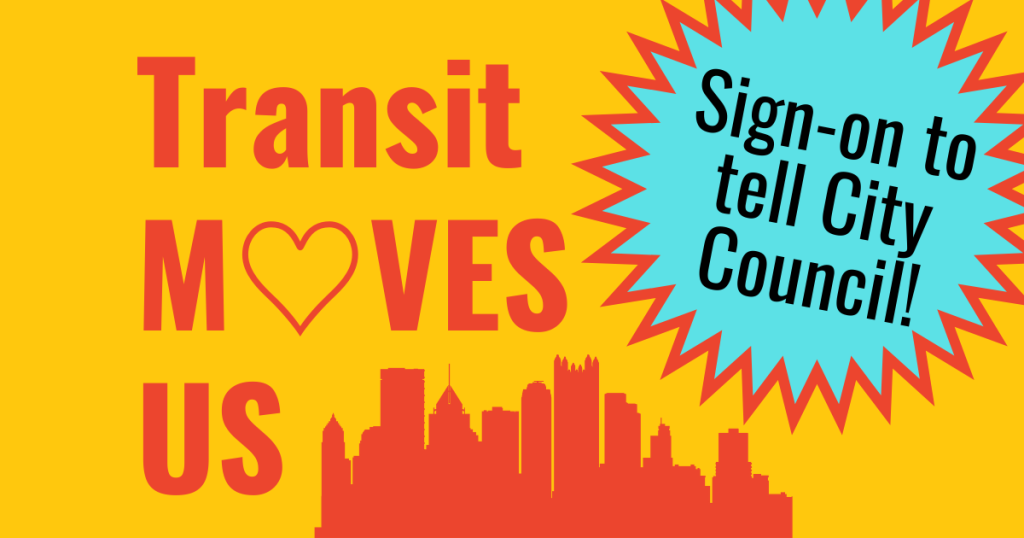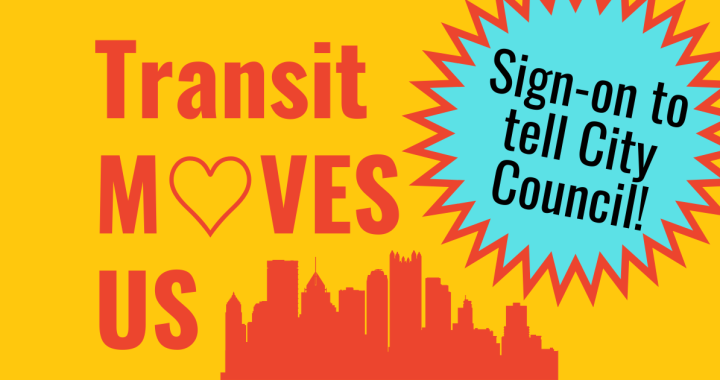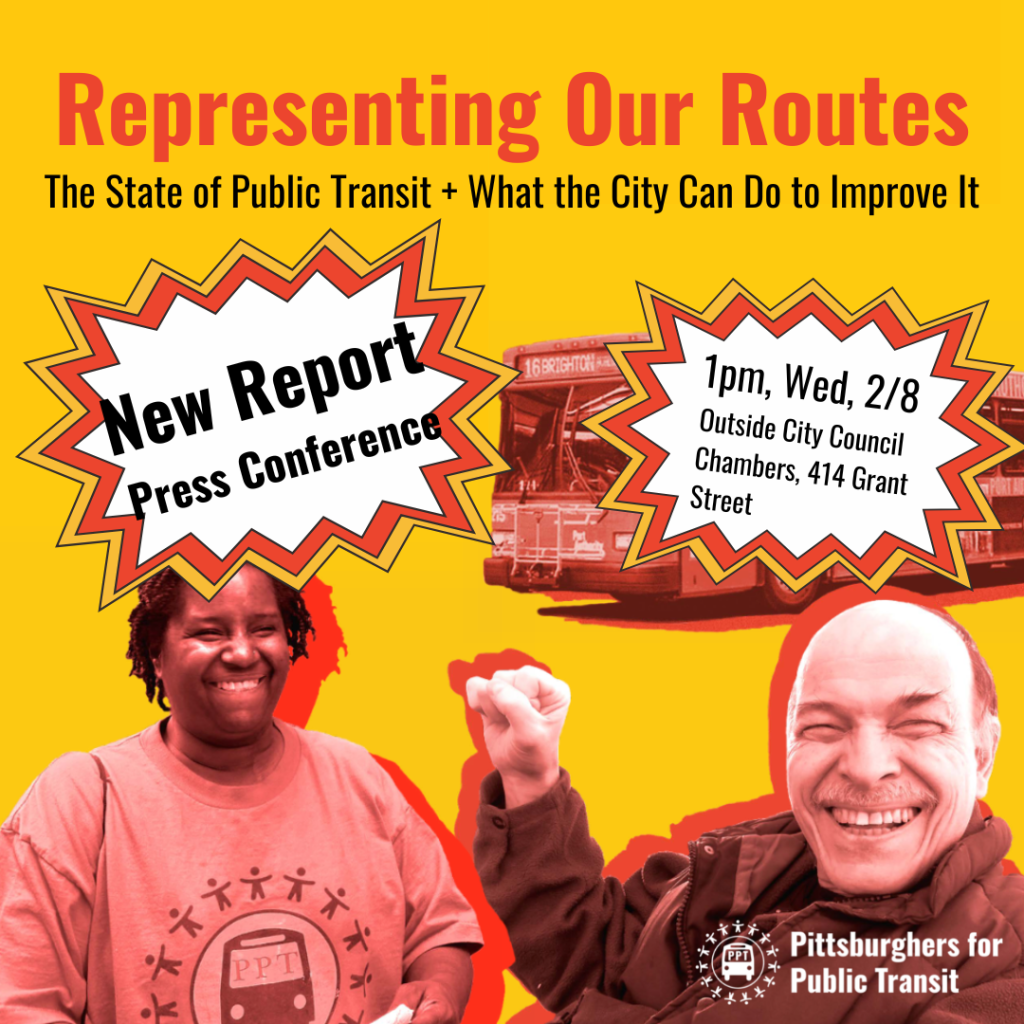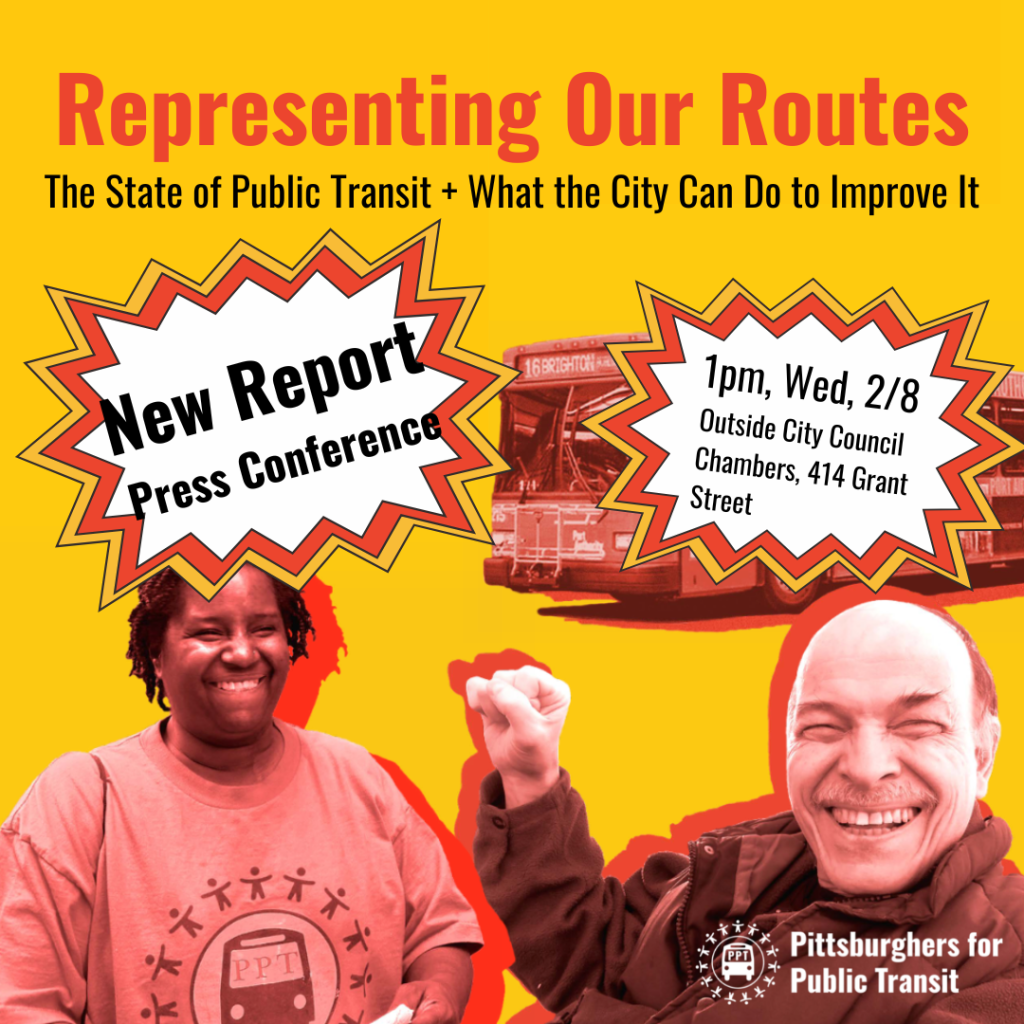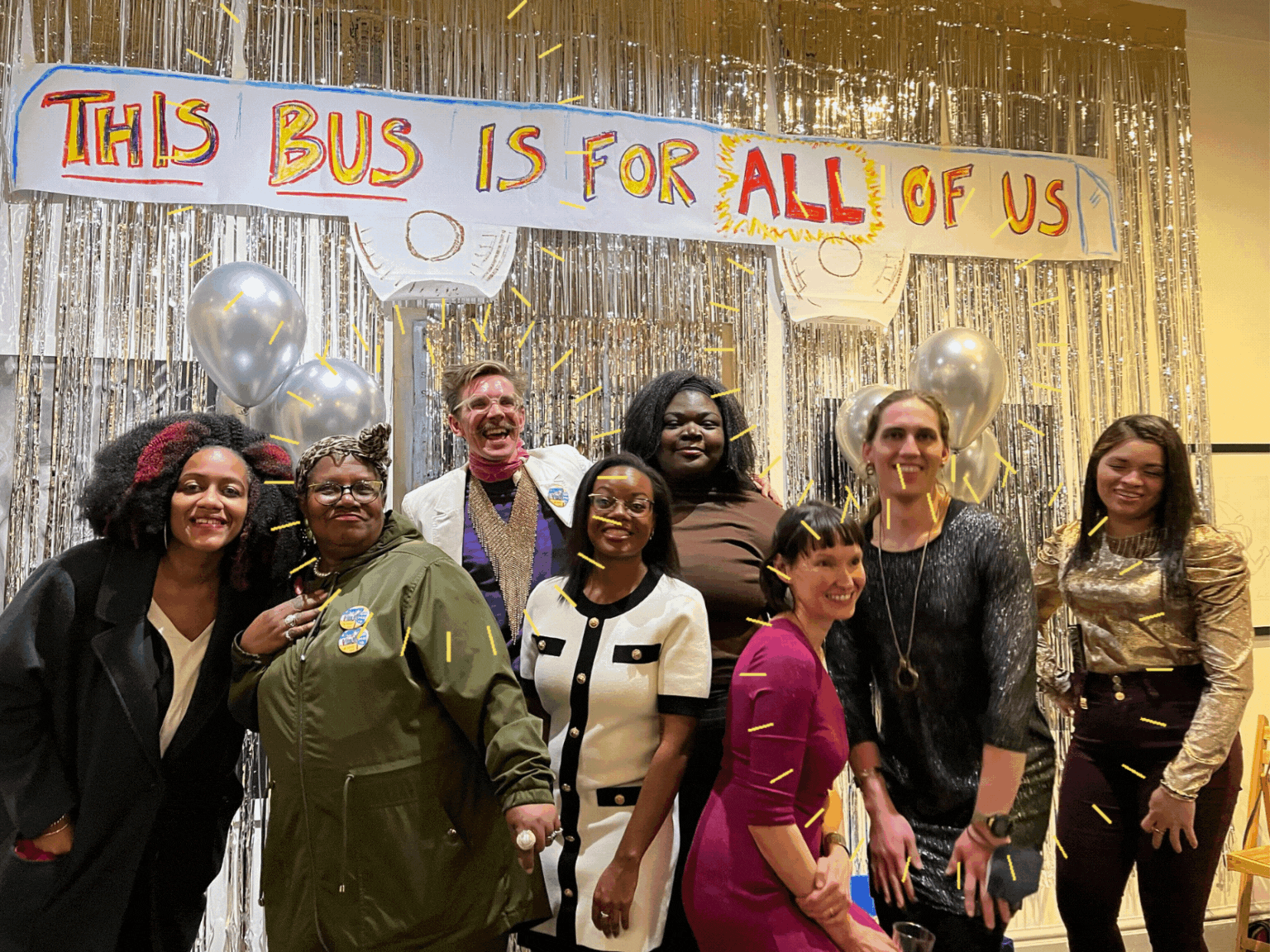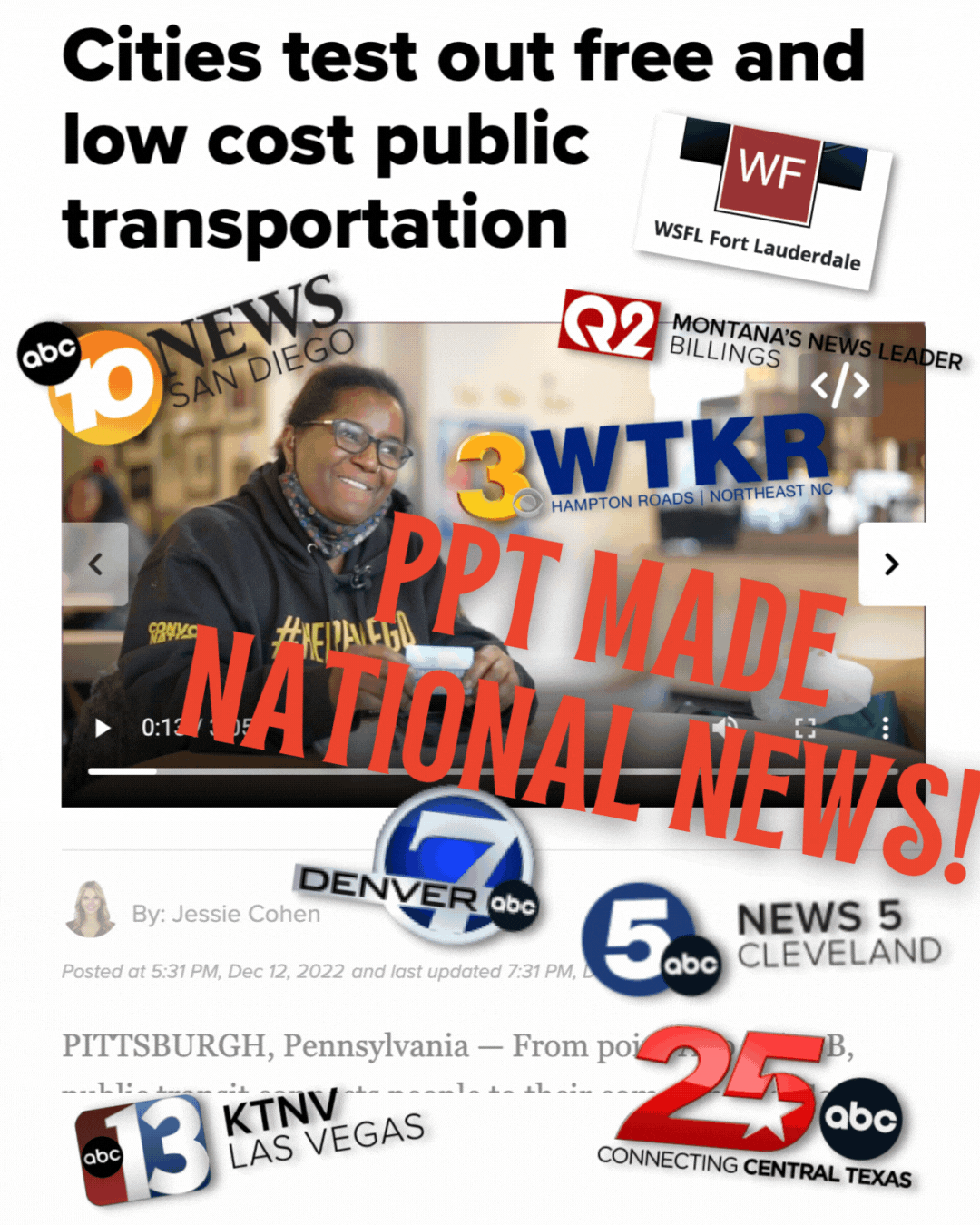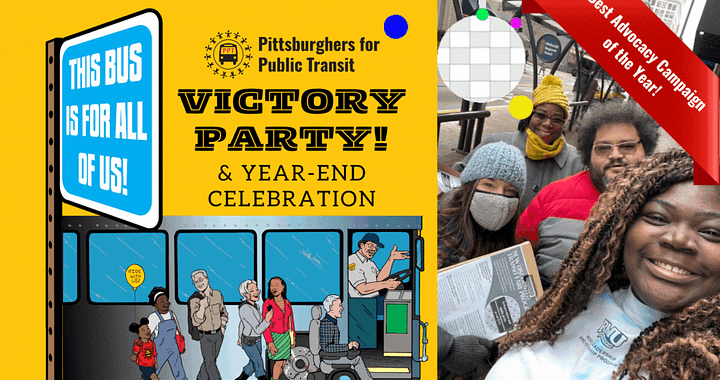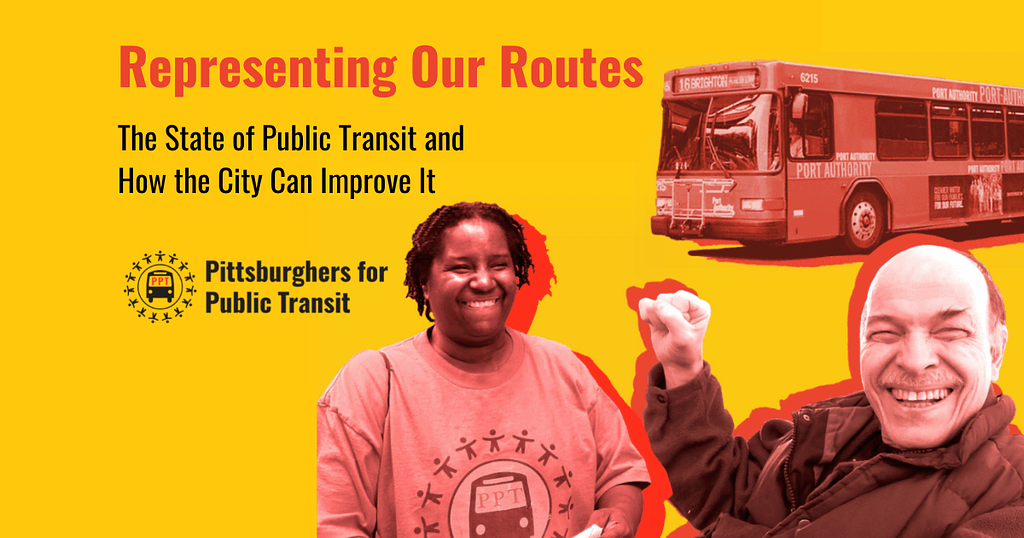
Transit riders release a new report to give the state of public transit in the City of Pittsburgh and outline steps for the City to improve it
Transit moves us. In the City of PIttsburgh, tens of thousands of residents—and the businesses that they work at and patronize—rely on affordable, timely transit service. Transit should be considered as vital to the city as other public utilities. However, over the past year, transit service in the Pittsburgh region has taken a significant turn for the worse. In 2022, Pittsburgh riders experienced a dramatic increase in overcrowded, chronically late and canceled buses and trains. Service data confirms transit riders’ poor experiences: Last year, 38 out of 105 Pittsburgh Regional Transit (PRT) routes were below 50% reliability for at least one month. And transit must be reliable for it to be useful. If riders have a 50% certainty or less than a bus or train will show up as scheduled, they will stop using the transit system.
PPT member and transit rider Lorena Pena recounts, “Last year when the Red Line train was not working, I struggled and my community struggled just to get around. We did not know when the shuttles were coming because they did not run on the same schedule as the train. Instead of waking up at 5:15 am for work, I had to set my alarm for 4:00 am just to ensure that I would arrive at work on time.”
On Wednesday, February 8th at 1 pm, Pittsburghers for Public Transit (PPT) hosted a press conference to release our new report, “Representing Our Routes: The State of Public Transit and How the City of Pittsburgh Can Improve It.” At the press conference, researchers shared broad trends from the report around transit service reliability in the City and key transit destinations, and transit riders from different Council districts will give testimony about their experience using transit in this past year. PPT members and the report identify ways in which City Councilmembers can support high-quality, reliable transit in their districts, and can enact policies laid out in the Pittsburgh 100 Day Transit Platform, now adopted into Mayor Gainey’s Transition Plan.
Read Representing Our Routes: The State of Public Transit and How the City Can Improve it
Representing Our Routes’ Key Takeaways
- All City Council districts were adversely affected by poor transit service reliability in 2022.
- Residents of every City Council district rely on transit, although access to jobs and other critical destinations on transit is uneven across districts.
- There is a lack of real-time, language-appropriate communication between PRT and transit riders to communicate service disruptions, service cuts, and bus stop removals—and the harm from this was particularly pronounced during the Red Line closures in the summer of 2022.
- Transit arrival times must match the published transit schedule in order to restore the trust that individuals, service providers, and employers must have in the transit system for it to retain and grow ridership.
- As in other cities, Pittsburgh City Council members can play a role in supporting and communicating with PRT about the transit service needs of their constituents. City Council can advance the Mayor’s transit-supportive infrastructure and land use policies that were adopted into his transition plan from the Pittsburgh 100 Days Transit Platform.
City Council can improve transit for city residents
As in other cities, Pittsburgh City Council can play an indispensable role in ensuring that our region’s public transit system is effective, equitable, and attractive that is often overlooked.
Given the current service reliability crisis facing constituents in every Pittsburgh City Council district, we need Council members to join us in calling on PRT to publish transit schedules that accurately reflect run times. That could include Council members testifying at PRT board meetings alongside transit riders, and asking that PRT to provide quarterly updates to Council on service reliability and frequency changes on routes within their districts.
If no improvements are made to service reliability, Council should call for a post-agenda hearing and invite riders and PRT leadership to discuss the issue, to explore the citywide impacts of the transit service issues, and to hear PRT lay out a timeline for improvements. Council staff members should also monitor service changes or bus stop removals that affect their districts on an ongoing basis, and serve as one important new avenue for communications between PRT and the community.
City Council can also play a more direct role in supporting public transit through land use and accessible infrastructure investments. PPT has laid out 18 specific policy recommendations in the Pittsburgh 100 Days Transit Platform, nearly all of which have been incorporated into Mayor Gainey’s Transition Plan. In the coming weeks and months, PPT would like to suggest Council support these four priorities for advancing equitable infrastructure and land use needs:
- Council should call on the City’s Department of Mobility and Infrastructure (DOMI) to reconvene the quarterly Complete Streets Committee. In the past, this committee had stakeholders from the community and organizations in the pedestrian, cycling and disability justice space, and helped prioritize traffic calming and pedestrian infrastructure investments. The reconstituted Complete Streets committee should have a high-level staffer from DOMI who explains how and where the City is evaluating and prioritizing sidewalk corridors for maintenance and development, streets for traffic calming, bus shelter creation and relocation, and other critical pedestrian investments. There should be space for discussion, feedback, and clear communication of the time- lines for implementation of these baseline equitable infrastructure investments.
- City Councilmembers should ensure that street planning foregrounds the need for more accessible, safer, efficient, and dignified transit stops everytime DOMI does significant street construction or redesign within their council districts.
- City Council should ensure that City Planning’s coming Citywide Comprehensive Plan requires equi- table transit-oriented development (ETOD), which marries affordable housing, density, and mix of retail and services in the communities with existing quality public transit.
- City Councilmembers should fund the forthcoming effort to provide free transit passes for all city employees, purchased at a bulk discount rate from PRT. Right now, it is cheaper for city employees to lease a monthly parking space downtown than it is to buy a monthly transit pass—a decision that also costs the city in lost revenue for the market value of those parking spaces. Providing free transit passes would incentivize better transportation behavior, reduce congestion, and be an enticing job perk to support city employee recruitment. Also importantly, it would challenge PRT to finally establish a bulk discount fare purchase program that could be made available to housing developers, large employers, and social service providers.
PPT is enthusiastic that Pittsburgh City Councilmembers have been receptive to these ideas. A majority of City Council and the Mayor’s office joined PPT at the press conference to recognize and support the need for accessible, reliable, affordable public transit for all, some even offering quotes of support
- Councilwoman Barb Warwick notes, “Forty-four percent of residents of District 5 are transit-dependent. Public transit is a top priority for me because all residents must be able to connect to the jobs, education, healthy food, and healthcare they need. Public transit should be as dependable, accessible and safe as any other utility, like water or electricity.”
- City Councilwoman Erika Strassburger says “Equitable transit-oriented development is a key priority of mine because I view it as integral to the future success of all Pittsburghers. I look forward to working with partners in City government, PRT, advocacy groups like PPT, and residents to improve access and reliability in all of our neighborhoods.”
- “As the Representing Our Routes Report shows, our Public Transit system is in desperate need of attention. As transit riders, we should not have to worry whether or not our bus will show up when we’re leaving for work, school, or running errands. Our region must assure that everyone has access to safe, reliable, and affordable transportation so that they can navigate the city without the use of a car. In order to achieve that goal, City Government must support efforts, such as the ones included in the Mayor’s Transition Plan, that promote transit-oriented development and expanded access to public transportation,” says Councilwoman Deb Gross
